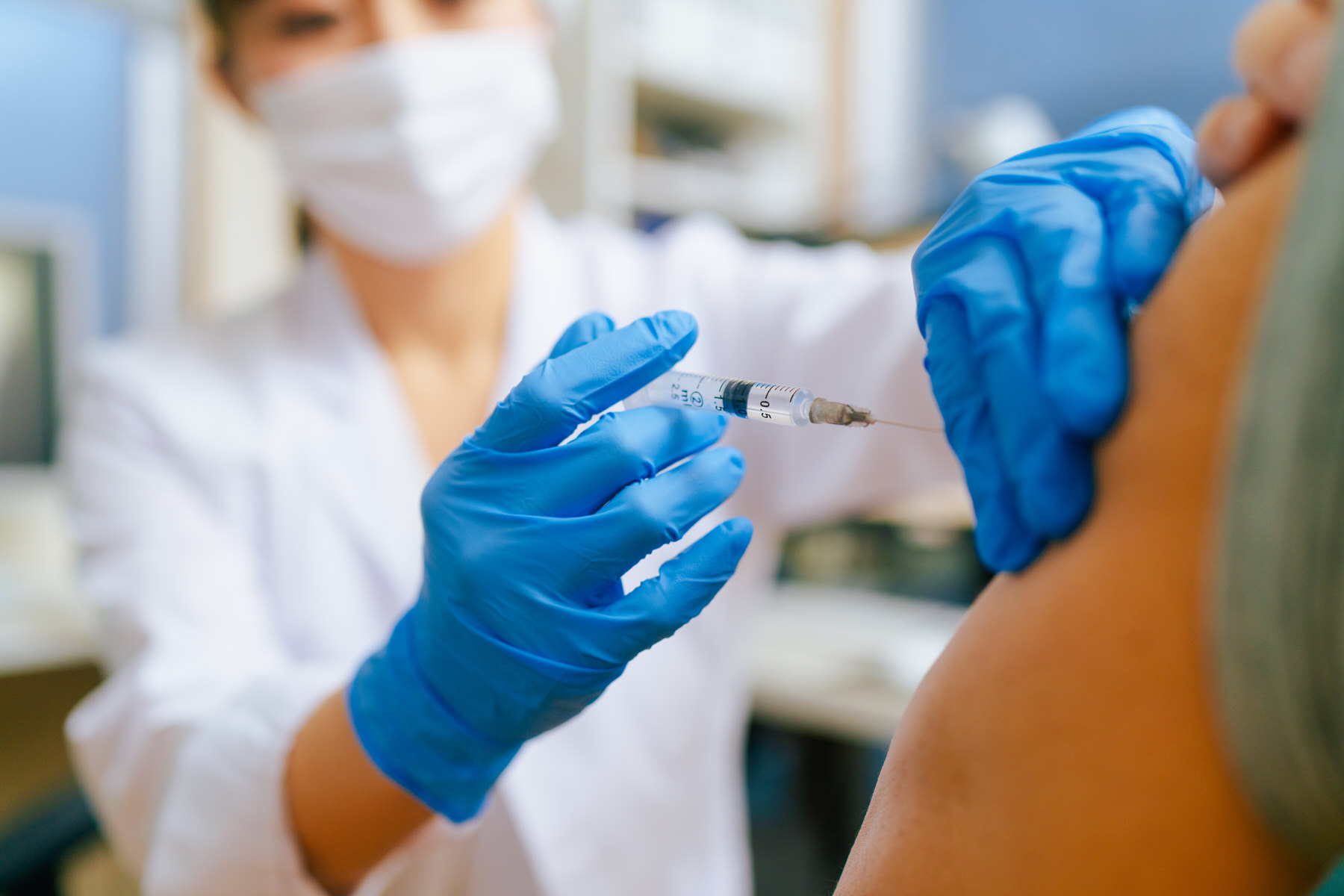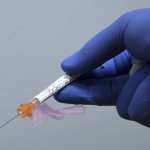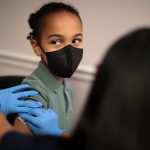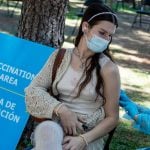For the 1.2 million people living with HIV, the idea is nothing short of a miracle: A vaccine for HIV is now just a step away from being eligible for review from the Food and Drug Administration (FDA)
Current trials are for people 18 and up, but it’s also possible over time that officials could lower the age for inoculation. Dr. Michelle D. Collins-Ogle, an infectious disease specialist with a focus in pediatric and adolescent HIV, told The 19th that vaccinating children against HIV is the only true path forward in ultimately eradicating it.
“Polio, smallpox — any disease you want to eliminate, you have to vaccinate kids,” she said. You have to eliminate it in the pediatric population, end of story.”
“We have been dealing with HIV for 40 years and we’re not going to be able to treat our way out of it, PrEP our way out of it,” she said, referring to an oral medication that keeps the virus from establishing itself. “If we could, we would have done so already.”
With this potential opportunity comes the intersection of two things that historically have given many parents pause for concern: introducing new vaccines to their children and talking about sex.
According to the Centers for Disease Control and Prevention, 1 in 4 new HIV infections occurs in people between the ages of 13 and 24, with the greatest number of infections among gay and bisexual youth. On top of that, health officials believe 60 percent of all youth with HIV do not know they are carrying the virus.
Debra Hauser, the president of Advocates for Youth — an organization that works to ensure young people have access to high-quality sexual health information and resources — told The 19th that the core issue is the oft repeated “myth” that giving people access to information and services pertaining to sexual and reproductive health will make them sexually active.
“This is not true,” Hauser said. “It’s like saying umbrellas cause rain.”
The American public has been down this road before. The Gardasil vaccine, which gained FDA approval in 2006, is currently approved for people ages 9 to 26. Gardasil protects against the human papillomavirus (HPV), both the strands that cause genital warts and the strands that cause cervical, vulvar and vaginal cancers.
When it was approved, it became the first vaccine on the market that protected against cancer; because of this, many public health experts assumed this would make it a slam dunk when it came to having parents interested in vaccinating their children. But because Gardasil protected against a virus that was sexually transmitted, it was instead met with a mix of outrage and concern from parents.
Collins-Ogle was a principal investigator on the Gardasil vaccine. Even from the earliest days of the vaccine’s development, researchers, including herself, were telling the pharmaceutical company that “messaging would be everything because the virus is associated with sexual transmission.” It’s something that she says is no less true today as we look at the future of the HIV vaccine.
Gardasil, Hauser said, effectively became patient zero in the “parent’s rights controversy — who has the right to decide if a young person does something or doesn’t do something. Is it the young person themselves, their parent or the state?”
Initial efforts to make Gardasil something that would be mandated by schools created even more blowback — which ultimately resulted in much lower numbers of young people getting vaccinated than public health officials had hoped, Hauser said. Even today, approximately 54 percent of American teenagers are fully vaccinated against HPV. Comparatively, 91.9 percent have received at least two doses of the measles, mumps and rubella vaccine and 91.6 percent have received at least three doses of the hepatitis B vaccine.
If and when the HIV vaccine gains approval, Collins-Ogle says she hopes that some lessons will be learned from what happened with Gardasil. To start, she says it would be helpful to initially roll it out how she wishes Gardasil had: Messaging it to age groups that are sexually active to achieve more “buy-in” before it is then walked down to young ones, to whom you can then say that this is a vaccine available to help protect you when you are older.
“As a pediatrician, I know how weird people get about their kids and sex,” she said. “If we message it [around sex] we will lose — and we lost big on Gardasil. There should have been so many more kids vaccinated who are not.”
An HIV vaccine has huge implications, even without taking the age of inoculation into account.
About 1.2 million people in the United States are living with HIV, according to the CDC. Officials reported about 34,800 new cases in 2019, the most recent year with available data. Though gay and bisexual men represented approximately 2 percent of the population in 2015, they represented 55 percent of all people living with HIV in the United States at that time. According to the Human Rights Campaign, 1 in 6 gay and bisexual men will be diagnosed with HIV in their lifetime if current rates of transmission continue. For men of color, the situation is even more urgent, with 1 in 4 Black men and 1 in 2 Latino men looking at a potential HIV diagnosis. Transgender women can be 49 percent more likely to be diagnosed with HIV than the general population.
If you link it with sex, then that’s how how people hear it.
Dr. Michelle D. Collins-Ogle
When HIV was still at the peak of its transmission across the United States, education about the virus as a chronic disease that can be effectively managed was lacking, Hauser said. Even now, in communities that seemingly provide access to high-quality sex education, this can begin to vary based on biases and stigma that exist around sex and young people.
And then there is the conversation around vaccination in general, which has become more fraught with the introduction of the COVID-19 vaccine, which uses the same mRNA technology as the HIV vaccine.
First and foremost, Hauser said, would be ensuring that young people are included in clinical trials early on. But Hauser also says that inclusion of young people must go beyond that.
“Just because you put young people through a clinical trial, that doesn’t mean that’s where to focus your efforts,” she said. “The number one lesson we learned from the Gardasil rollout is that we need to equip young people to know how these vaccines work and who they are meant for, so that public trust is built up before the vaccine even makes its way to market.”
And there are misconceptions about how vaccines work, Collins-Ogle said.
“We don’t talk about prevention, and we get it wrong a lot of the time. It’s too late with Gardasil and we don’t get a do-over.”
Collins-Ogle points to the meningitis vaccine as an example of how messaging is done well: “If I say this prevents meningitis, you’ll do it. If I say you may not get ear infections, you won’t. It has to be about talking about life-saving vaccines.” ”
For vaccines like Gardasil and the potential HIV inoculation, she said, “If you link it with sex, then that’s how people hear it.”
Depending on what the clinical trials find, and what the youngest age the HIV vaccine ends up getting approved for, Collins-Ogle said it will also be important for doctors, and pediatricians especially, to explain to parents the reason that children are able to — and should — get vaccinated.
“If I vaccinate you as a kid, your immune response is going to be awesome. If I wait until you’re older and have a more challenged immune system, it will be less robust. This is not because I want them having sex at 13, but because I want to get to their immune system while they’re still a kid.”
Collins-Ogle said she also hopes that a widely available HIV vaccine will also help open up a dialogue about the ways that HIV is traditionally associated with sex, gay men and men of color, failing to accurately capture the realities of the virus today. “What if you have drug addiction? What if you have a partner who was incarcerated?”
That said, Louie Ortiz-Fonseca, the director of LGBTQ health and rights at Advocates for Youth, also noted that talking about sex still needs to be a part of the conversation as a preventive measure against HIV, including promoting eventual vaccination.
“Parents think that talking about sex has to be done in privacy or as a whisper,” he said. “That just shows young people that sex is intended to be something they are ‘not supposed to do.’ But once those conversations are happening and we can couch them in the language of health, everything changes. We can talk about sex in the context of not because something ‘wrong’ happened or will happened, but the same way we talk about mental health, dental care, even skin care,” he said.
Collins-Ogle hopes that if an HIV vaccine becomes something for adolescent patients to consider, pediatricians can lead the charge in a way they didn’t in the Gardasil rollout by having one-off conversations with their own patients and meeting each individual family and their concerns exactly where they are.
This includes, especially in light of the COVID-19 vaccine roll-out, explaining the way that mRNA technology works and why it is the best mechanism for delivering an effective vaccine against HIV. This also might mean explaining why past attempts at developing a vaccine utilizing different technologies haven’t worked.
“Because of the way that mRNA works and produces a spike protein on your cells, when the virus comes to infect you and sees that spike body on that cell, your body makes antibodies in response,” Collins-Ogle said. She added that she also hopes people will recognize that mRNA technology is the best platform when it comes to eradicating viruses that mutate, as the mRNA platform allows for tweaking the vaccine when inevitable mutations occur (as is and will continue to be the case with COVID-19).
And if the vaccine succeeds in clinical trials and wins FDA approval, it changes how parents and those living with HIV are now able to imagine the future.
The development holds special meaning for Ortiz-Fonseca, who has spent years advocating and organizing on behalf of people living with HIV and AIDS.
“As a person living with HIV, I never thought I would live long enough to see this,” Ortiz-Fonseca said. “It’s indescribable as a person with HIV to be here. I get it, and I read about it, and I understand that for years this has been in the works and I have kept tabs on the possibility of this happening and now on the dawn of it, it’s like — is this real?”
Ortiz-Fonseca is also a parent, and his 18-year-old son is likely to qualify for any such vaccine.
“This is one less trauma being passed down,” he said. “Now he gets to thrive, and have the time and space to dream and to worry about other things.”







